Before you start learning about the personalities and traits of the many dog breeds, here are some points you should consider when deciding which dog is perfect for you:
Your Dogs Temperament
Your dogs temperament should match yours. Don't choose a breed that is highly energetic if you're a couch potato. On the other hand, if you want a dog that will follow you everywhere around the house and who is always ready for a game of fetch or tug of war then you should consider a dog that is highly active and always has a lot of energy, instead of one of the lethargic breeds.
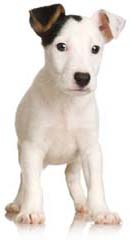
Large or Small Dog
You don't have to have own a large house to own a large dog (although a tiny apartment isn't going to be big enough for one of the giant breeds). If you can take him outside for a good hour of two of exercise every day... a large dog can live in a small house or apartment just fine.
Keep in mind that large dogs are more expensive to keep. They eat more food, which costs you more money. Tick and flea preventives cost more for large dogs, as do other mediations.
When large dogs eliminate, they eliminate a lot more than small dogs - more goes in and more comes out - of large breeds. Which is something to keep in mind if your dog will live inside - especially if you live in a high rise apartment and he will have to be litter box trained (there's always going to be more to clean up).

Do You Have Time To Exercise Your Dog?
All dogs should get as much exercise as possible - a good walk and a run everyday. But most small dog breeds, for example Toy dogs such as Pugs, Maltese or Yorkshire Terriers, will get the majority of their required exercise needs just be walking, running and playing around indoors.
Some breeds have so much energy and are so active that if you don't give them a sufficient workout everyday - a long walk and hard run - their pent up energy will quite likely manifest itself in destructive behavior.
So if you don't have time to walk your dog everyday choose a breed who doesn't have high exercise requirements. All of the breeds who require high amounts of exercise make terrific jogging, hiking, and ridding companions. So if you want your dog to accompany you on long runs choose one of these highly active breeds built for endurance and as much exercise as you can throw at them - they'll love you for it.
Do You Have Children?
 Most all dogs will get along well with children if they are raised with them. However, some breeds have a protective streak in them and may naturally become aggressive towards children around meal time (although this should not be tolerated), or aggressive to strange children. They possibly will not see the children as being higher then themselves in the "pack order" and may try to dominate them.
Most all dogs will get along well with children if they are raised with them. However, some breeds have a protective streak in them and may naturally become aggressive towards children around meal time (although this should not be tolerated), or aggressive to strange children. They possibly will not see the children as being higher then themselves in the "pack order" and may try to dominate them. Some dogs will put up with little children who pull their ears or poke them in the eyes, while others will not and map nip or bite back in defense.
So if you want a dog who is excellent with children avoid breeds which may have a dominance streak or that have short tempers.
Less or More Time Consuming
Dogs with short coats require virtually no grooming, just a brush and wipe down every so often. Pet dogs with long coats require either regular clipping (every eight weeks or so) and a brush once or twice per week. Show dogs, or dogs with long coats, require daily brushing. If you don't brush your dogs long coat regularly it will tangle and matt. No only can it hurt your dog if he has tangled, matted hair, but it will become dirty and he will look shaggy and ugly if you don't regularly groom his coat.
So keep in mind that if you choose a breed with a long coat you will need to get it clipped regularly if you want to avoid brushing it so much, or if you choose to keep it long or even medium length you will have to brush it everyday.
Dogs with short coats also have another advantage. It's easier to find ticks and fleas on their body. You probably spend eight times as long searching for fleas and ticks on a dog with a long coat than you do on a dog with a short coat.
If you don't want to be vacuuming the house every day, then don't buy a high shedding breed. If you own a high shedding dog you will find hair everywhere! Including on your clothes, on your furniture, in your bed, and even in your food. Additionally dogs that have a high shedding rate need to be groomed more often to brush out the dead hair.
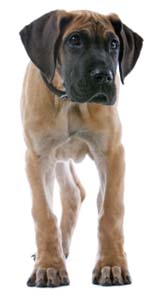
Are You Allergic To Dander?
It isn't the dog hair that causes allergies - it's the dander! Dogs continually shed dander, or dead skin flakes, from their bodies. When this dander is airborne you can inhale it and it may cause an allergic reaction (itchy eyes, runny nose, sneezing or wheezing). If you have allergies to dander, and still want a pet dog, then you should consider one of the low shedding dog breeds because they produce less dander. Some of these breeds include the Poodle, Maltese, Bichon Frise, Bedlington Terrier and Chinese Crested just to name a few. Choose a breed which is rated "Low" for shedding if you have allergies. To be on the safe side, check the breed you are thinking of owning doesn't cause you to have an allergic reaction by spending several hours around a dog of that breed before you purchase one!
Intelligent And Easy To Train
Every breed can be trained to learn almost every command. However, some breeds learn a lot faster than others - making them a lot easier to train. These highly intelligent breeds pick up a command after only about five or six exposures, they more often respond on the first time you give the command, and they remember commands even if they aren't practiced often. They also learn commands even when the trainer is inexperienced and makes mistakes.
So if you don't have a lot of the time to spend dog training, or you are impatient and get frustrated easily, choose a breed which has a high easy of training rating.
Protection
 Dogs can either serve as watchdogs or guard dogs. A watchdogs job is to bark and raise the alarm when a stranger enters your property. Many small dog breeds make great watch dogs. Whereas a guard dog's job is to look intimidating and protect his family if the situation arises.
Dogs can either serve as watchdogs or guard dogs. A watchdogs job is to bark and raise the alarm when a stranger enters your property. Many small dog breeds make great watch dogs. Whereas a guard dog's job is to look intimidating and protect his family if the situation arises. These are the important factors to consider when making a decision about which dog is for you. With these points in mind, browse through the dog breed profiles and discover which dog will be a perfect match for you.




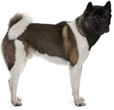

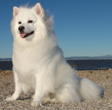














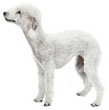




















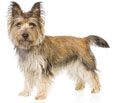







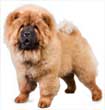
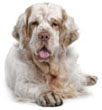






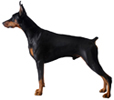






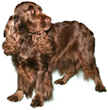
















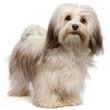














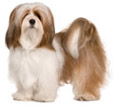






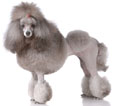















































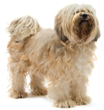











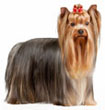
You have got a very nice dog breeds list with great amount of information. Thank you so much for sharing such a nice post.
ReplyDelete